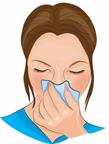ThisisPatientEngagementcontent
Cough (Adult)
Learn more about our Patient Engagement products now! Turn your patients into active participants in their healthcare by giving them easy access to the same evidence-based information you trust – but delivered in an easy-to-understand format.
Coughing is a reflex that clears your throat and airways (respiratory system). It helps heal and protect your lungs. It is normal to cough from time to time. A cough that happens with other symptoms or that lasts a long time may be a sign of a condition that needs treatment. A short-term (acute) cough may only last 2–3 weeks. A long-term (chronic) cough may last 8 or more weeks.
Coughing is often caused by:Medicines
Eating and drinking
Lifestyle
General instructions

This information is not intended to replace advice given to you by your health care provider. Make sure you discuss any questions you have with your health care provider.
Cookies are used by this site. To decline or learn more, visit our cookie notice.
Copyright © 2025 Elsevier, its licensors, and contributors. All rights are reserved, including those for text and data mining, AI training, and similar technologies.